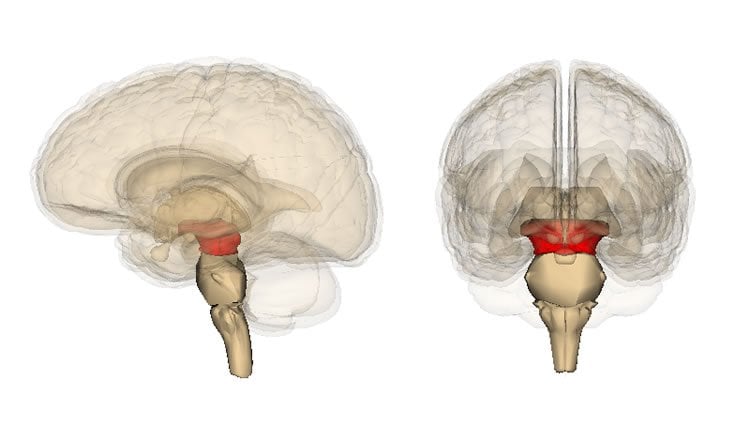Summary: According to researchers, our ability to track and understand speech in both noisy and quite environments deteriorates due to speech processing declines in the midbrain of older adults.
Source: American Psychological Society.
Study finds midbrain and cortex show deficits.
Researchers have found clues to the causes of age-related hearing loss. The ability to track and understand speech in both quiet and noisy environments deteriorates due in part to speech processing declines in both the midbrain and cortex in older adults. The paper, published in the Journal of Neurophysiology, was chosen as an APSselect article for October.
Thirty-two native English-speaking volunteers with clinically normal hearing were assigned to two groups: younger adults (average age, 22) and older adults (average age, 65). The research team measured the volunteers’ speech comprehension using the Quick Speech-in-Noise (QuickSIN) test. The researchers also gave the volunteers an electroencephalogram, which measured mid-brain activity, and a magnetocephalogram to measure cortical activity. For both groups, the researchers calculated the listeners’ ability to comprehend speech in quiet settings and environments with more than one person talking. Background noise was delivered in four distinct signal-to-noise ratios (SNR), which measures signal strength (i.e., the primary talker) relative to background noise (i.e., the competing reader).
The researchers found that the older group had more trouble tracking speech than the younger group in both quiet and noisy environments across all SNRs. The older adults took more time to process several acoustic cues, such as accuracy of speech, and also scored lower on the QuickSIN test for speech comprehension in noise. Deficits from aging were also seen neurally, both in midbrain and cortex, according to the researchers. These results suggest that age-related problems with understanding speech are not only due to the inability to hear at certain volumes but also occur because the aging brain is not able to correctly interpret the meaning of sound signals.

Source: Stacy Brooks – American Psychological Society
Image Source: NeuroscienceNews.com image is credited to LSDB and is licensed CC BY SA 2.1 jp.
Original Research: Abstract for “Effect of informational content of noise on speech representation in the aging midbrain and cortex” by Alessandro Presacco, Jonathan Z Simon, and Samira Anderson in Journal of Neurophysiology. Published online September 7 2016 doi:10.1152/jn.00373.2016
[cbtabs][cbtab title=”MLA”]American Psychological Society. “Our Ability to Process Speech Declines With Age.” NeuroscienceNews. NeuroscienceNews, 4 October 2016.
<https://neurosciencenews.com/aging-speech-processing-5197/>.[/cbtab][cbtab title=”APA”]American Psychological Society. (2016, October 4). Our Ability to Process Speech Declines With Age. NeuroscienceNews. Retrieved October 4, 2016 from https://neurosciencenews.com/aging-speech-processing-5197/[/cbtab][cbtab title=”Chicago”]American Psychological Society. “Our Ability to Process Speech Declines With Age.” https://neurosciencenews.com/aging-speech-processing-5197/ (accessed October 4, 2016).[/cbtab][/cbtabs]
Abstract
Effect of informational content of noise on speech representation in the aging midbrain and cortex
The ability to understand speech is significantly degraded by aging, particularly in noisy environments. One way that older adults cope with this hearing difficulty is through the use of contextual cues. Several behavioral studies have shown that older adults are better at following a conversation when the target speech signal has high contextual content or when the background distractor is not meaningful. Specifically, older adults gain significant benefit in focusing on and understanding speech if the background is spoken by a talker in a language that is not comprehensible to them (i.e. a foreign language). To better understand the neural mechanisms underlying this benefit in older adults, we investigated aging effects on midbrain and cortical encoding of speech when in the presence of a single competing talker speaking in language that is meaningful or meaningless to the listener (i.e., English vs. Dutch). Our results suggest that neural processing is strongly affected by the informational content of noise. Specifically, older listeners’ cortical responses to the attended speech signal are less deteriorated when the competing speech signal is an incomprehensible language than when it is their native language. Conversely, temporal processing in the midbrain is affected by different backgrounds only during rapid changes in speech, and only in younger listeners. Additionally, we found that cognitive decline is associated with an increase in cortical envelope tracking, suggesting an age-related over (or inefficient) use of cognitive resources that may explain their difficulty in processing speech targets while trying to ignore interfering noise.
“Effect of informational content of noise on speech representation in the aging midbrain and cortex” by Alessandro Presacco, Jonathan Z Simon, and Samira Anderson in Journal of Neurophysiology. Published online September 7 2016 doi:10.1152/jn.00373.2016






